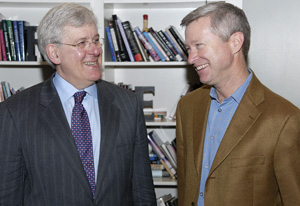Two dozen scholars from around the world will gather at the University of California, Santa Cruz April 8-10 to examine the social and political effects of modern-day capitalism and the global economy in light of esoteric financial instruments that nearly brought it down.
The conference is free and open to the public. It is the first major undertaking of the Bruce Initiative on Rethinking Capitalism founded by Stephen Bruce, a UC Santa Cruz economics graduate who went on to a successful career in international asset management. The Bruce Initiative is administered by UCSC's Institute for Humanities Research. Because seating is limited, reservations are requested and may be made at http://community.ucsc.edu/rethinkingcapitalism.
The esoteric financial instruments are generally known as "derivatives" because their value derives from something else. Derivatives are not tangible commodities such as land, a truckload of grain, or barrel of oil. Yet they are traded as "property," bought and sold on world markets in microseconds with computerized trading programs. As such, derivatives are responsible for the movement of trillions of dollars of capital and the attendant profits and losses.
Conference director Bob Meister, UC Santa Cruz professor of political and social thought, has been studying these financial instruments for some time, along with their profound impact on the economy and economic theory. He said he sees their reflection in fields beyond finance, including cultural studies, anthropology, ethics, behavioral economics, economic sociology, geography, decision theory, political theory and new forms of theology.
Meister said he wanted to bring the latest scholarship in these other fields into conversation with scholars who have studied financial derivatives since their inception. Both he and Bruce, who shared the intellectual excitement of UCSC in the 1970s, hoped to restore that excitement by integrating a series of conferences on campus with the development of new undergraduate and graduate courses, open to all disciplines, that would make these scholarly discussions available to UCSC students.
This first conference has two purposes, Meister said: First, a public purpose of "informing an audience of the latest and most creative thinking of the issues that underlie the massive crisis that we've experienced throughout the world during the past few years."
Second is to introduce conference participants, "perhaps for the first time, to each other and to the significant number of thinkers at UCSC who are interested in these problems with the hope that we can develop a scholarly and perhaps also a political community of thinkers who are interested in meeting more regularly to address these questions."
Bruce, who grew up in Santa Cruz, graduated from Cowell College in 1979. He is chair of the Board of Councilors, an advisory group to Social Sciences Dean Sheldon Kamieniecki.
Bruce reconnected with UCSC three years ago when he funded fellowships for aspiring high school math and science teachers and graduate students in politics. He also reconnected with Meister, a favorite professor from his undergraduate years.
"Bob was fascinated with derivatives, the math, the markets," recalls Bruce, who now lives in Los Angeles. "I'd tell him about things I see in the markets. He said 'we should put together some kind of conference.'"
The questions they discussed at the time - remember this was in early 2007 - were narrower than they are today -- legal issues, contracts, questions of value, Bruce said. Then came the financial collapse of 2008 and "we said, 'wow, we should look at the future of capitalism.'"
Participating fellows hail from universities around the country and also England, Germany, Australia, and India. Several UC Santa Cruz professors in anthropology, economics, and politics, will also take part.
Bruce and Meister said they have invited scholars who may not be well known but are doing groundbreaking work in the field. "The future stars," said Bruce.
They hope for a continuing conversation among participants and are already lining up panelists for next year's conference.
Bruce said technology will play a major role in the conference with a webcast and text messaging of questions and comments.
Rethinking Capitalism is co-sponsored by the UCSC Division of Social Sciences, UCSC Institute for Humanities Research, and Colleges 9/10.
Additional information is available at www.rethinkingcapitalism.org



